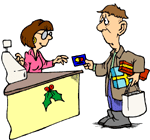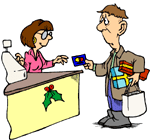Every year, long before the last of the Halloween candy has been eaten, the drumbeat of holiday consumerism ushers in a long, wasteful, expensive march to New Year’s. Now Holiday 2002 is finally over, and apparently it’s just as well, because it turns out the season was a “failure.” This information comes not from our friends, our family, or even our clergy, but from CNBC, the Wall Street Journal, and Alan Greenspan. American “family values” are great — so long as American families value consuming ’til it hurts.

Charge!
Recently, the Washington Post business section ran a story trumpeting the fact that the Gross Domestic Product for the third quarter of 2002 exceeded expectations. On the other side of the page was an item announcing that personal bankruptcies had reached an all-time high. Had anyone bothered to connect the dots, they would have concluded that propping up the economy requires financial pain and crippling debt for millions of American families. And that means our economy is in even deeper trouble than we thought: If my neighbor across the street has to declare bankruptcy in order for my neighbor next door to keep his retail job, our economic system isn’t delivering on its promise. It’s in this context that we should be thinking about our spending and consuming habits, during the holidays as well as throughout the year.
Most Americans understand the consequences of trying to live up to the visions of happy holidays conjured by Wall Street and Madison Avenue. In a 2002 holiday poll designed by the Center for a New American Dream, 77 percent of respondents expressed a desire to simplify their holiday celebration. But translating that desire into practice proves difficult for most people, and no wonder. Holiday commercialism has reached saturation levels, and the mandate to consume is virtually impossible to escape.

Buy, buy love.
This mandate has particularly potent effects on children. My six-year-old daughter, who hasn’t seen a television commercial in ages, sat down and penned an extremely specific note to Santa in which she listed the dolls and toys she wanted in excruciating, brand-name detail. How did she know about this stuff? From her friends, and from ads in the Sunday newspaper. The message to parents is clear: You can run, but you can’t hide. She didn’t get most of the stuff on her list, but it required all my wife’s and my parenting skills to keep her from emerging from the holidays disappointed.
Is all this commercialism getting to us? You bet it is. In a different Center for a New American Dream poll, conducted a few years ago, more than nine out of 10 Americans surveyed felt the holidays had become too commercialized. This year, nearly three out of five respondents said they planned to buy fewer gifts or spend less money. Maybe 2002 will become known as the year Americans started pushing back a little bit. Perhaps, in the face of economic insecurity and the desire to find deeper meaning during a very challenging time, we actually did simplify our holidays. Maybe we did make an effort to spend less money, stay out of debt, and connect with friends and family in a more meaningful way. These changes may result in gloom and doom stories in the newspaper and dire predictions about the future of American life as we know it. But don’t be fooled: They are good for our quality of life and good for our environment.
If you were among the stalwarts who managed to stave off the holiday consumer frenzy this year, good for you. If things didn’t go the way you wanted them to, now’s the time to plan ahead. Try to envision a future where the arrival of your January credit card bill won’t make you feel sick. Talk to your friends and family about what you could do differently next year. Think about how you’d like to be living your life when Holiday 2003 rolls around, and make good use of those New Year’s resolutions.



